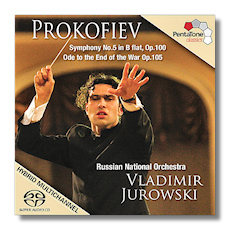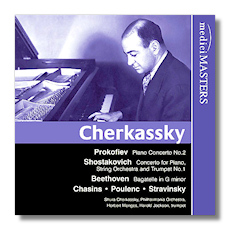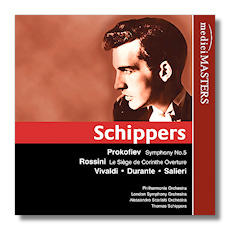
The Internet's Premier Classical Music Source
Related Links
-
Beethoven Reviews
Poulenc Reviews
Prokofieff Reviews
Rossini Reviews
Shostakovich Reviews
Stravinsky Reviews
Vivaldi Reviews - Latest Reviews
- More Reviews
-
By Composer
-
Collections
DVD & Blu-ray
Books
Concert Reviews
Articles/Interviews
Software
Audio
Search Amazon
Recommended Links
Site News
 CD Review
CD Review
Serge Prokofieff

Vladimir Jurowski Conducts
- Symphony #5 in B Flat Major, Op. 100
- Ode to The End of the War, Op. 105
Russian National Orchestra/Vladimir Jurowski
PentaTone SACD PTC5186083


Shura Cherkassky Plays
- Serge Prokofieff: Piano Concerto #2 1
- Dmitri Shostakovich: Piano Concerto #1 1
- Abram Chasins: Three Chinese Pieces
- Francis Poulenc: Toccata
- Igor Stravinsky: Circus Polka
- Ludwig van Beethoven: Bagatelle in G minor, Op. 119 #1
Shura Cherkassky, piano
1 Philharmonia Orchestra/Herbert Menges
Medici Masters 013-2 ADD mono 70:04


Thomas Schippers Conducts
- Serge Prokofieff: Symphony #5 1
- Gioachino Rossini: L'assedio di Corinto: Overture 2
- Antonio Vivaldi: Sinfonia "al Santo Sepolcro" in B minor, R.169 3
- Francesco Durante: Concerto #5 in A for String Orchestra 3
- Antonio Salieri: Axur, re d'Ormus: Overture 3
1 Philharmonia Orchestra/Thomas Schippers
2 London Symphony Orchestra/Thomas Schippers
3 Orchestra Alessandro Scarlatti/Thomas Schippers
Medici Masters 012-2 ADD 3mono 72:54
Young Vladimir Jurowski, son of conductor Michail Jurowski, steps into territory one might think would be better left to his father, an admired Prokofieff interpreter. But Vladimir has his own ideas and makes a good case for them. That said, the performance is not without its drawbacks, chief among which is a sudden drop-out during the crucial buildup that closes out the Fifth's first movement: just as the music is building with huge wave upon huge wave of sound, Jurowski brings the orchestra's dynamics back to piano, then quickly takes them back up to forte. It doesn't work, I'm afraid. In fact, it sounds decidedly odd. In his handling of tempos Jurowski shifts gears a lot, with sudden accelerations: try the ending of the first movement exposition, where the fast, sort of mocking theme (heard throughout, especially in the development section), suddenly takes off like a bullet, or the Scherzo, where there is a peculiar acceleration in the quiet section just before the Trio is presented. For all its eccentricities though, this performance is always interesting, especially in the dark third movement, where the middle section, for once, sounds truly threatening. The finale too, is well conceived in its crisp wind playing, scampering strings and brilliant percussive effects, particularly in the race-to-the-finish ending. Bernstein in either of his two recordings and, most recently, Gergiev are preferable, but Jurowski is probably worth a listen if you want to hear a different approach to this warhorse.
What may make this recording most desirable is the coupling, The Ode to the End of the War, a work scored for wind ensemble, 8 harps, 4 pianos, 8 double basses and percussion. Jurowski is gives this unusual piece a relatively gentle treatment, in contrast to Rozhdestvensky, who makes it raucous and over-the-top. Jurowski brings out more detail in the scoring and tries to show that the piece has a measure of depth. Overall, Jurowksi's is probably the preferred version (there's more sheer magic and color in his middle section), even though Rozhdestvensky's may be closer to the composer's intentions. The sound on both works on this PentaTone CD is good, but recorded at a low level.
The other Prokofieff Fifth here is the 1957 effort by then-wunderkind Thomas Schippers, whose life was cut short at 47 years of age by lung cancer. Schippers delivers a more conventional reading: it is well-phrased and well played by England's then-leading orchestra, the Philharmonia. It has an especially epic character in the first movement: in the development section the alternate theme is phrased majestically, not rushed as in so many recordings. In fact, the first movement on the whole is one of the better accounts on record. The Scherzo goes reasonably well too, although in the Trio some of the brass underpinnings get a bit intrusive. Schippers plays the original version of the work – that is, there is no gradual quickening of the tempo during the buildup to the return of the main theme in the Scherzo. The Adagio and Finale are executed pretty well also, and the sound is excellent for its age. If I had to choose between the two Prokofieff Fifths here, the Schippers would be the clear winner.
His fillers are a hodgepodge and ultimately a bit out of place, considering that the headline work is the Prokofieff Fifth. The Rossini and Salieri works sparkle in utterly energetic performances, and the mournful Vivaldi work charms. The Durante Concerto, an attractive light work, comes across as a quite worthwhile piece. The sound here is also quite decent.
Cherkassky's Prokofieff Second may well have been the first recording of the work, at least in the West. Recorded in 1954-55, when the concerto was virtually unknown outside the Soviet Union, it is truly a kinder, gentler approach to this stormy, dark work. It was as if Cherkassky wanted to make the concerto sound more appealing to audiences who might find its long, thunderous cadenza and plentiful dissonances a bit harsh. At any rate, it's an interesting, if slightly wrong headed performance that has enough going for it to appeal to fans of the pianist and of the challenging Prokofieff Second. Gutierrez (Chandos) and Ashkenazy (Decca) are the preferred choices in this great work.
The Shostakovich First is given a more conventional treatment, even if its humor and playfulness are rendered in a somewhat straitlaced manner. The solo pieces are well played, especially the Chasins' Three Chinese Pieces and Stravinsky transcription of the Circus Polka. The mono sound in the solo pieces (recorded in 1955-56) is reasonably good.
Copyright © 2008, Robert Cummings




















